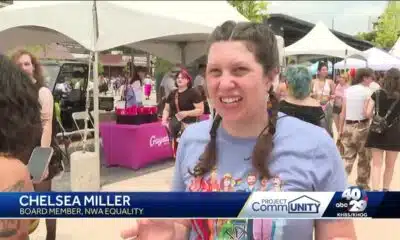News from the South - Florida News Feed
SC doctors seek conscience protections to provide abortion care in new federal lawsuit • Florida Phoenix
SC doctors seek conscience protections to provide abortion care in new federal lawsuit
by Sofia Resnick, Florida Phoenix
February 8, 2025
About three months into conceiving their second child last fall, the young South Carolina couple was given an earth-shattering prognosis. And two grim choices.
Based on multiple genetic tests and an ultrasound that indicated the baby was not growing normally, a maternal-fetal medicine specialist suspected triploidy, a deadly genetic disorder in which chromosomes are tripled rather than doubled. The couple could wait for their daughter to die in utero or within minutes or hours of being born. Or they could terminate.
But because of a nascent law in South Carolina — which bans pregnancy termination if cardiac activity is detectable on an ultrasound — the couple now had to prove their baby’s condition was fatal in order to qualify for an abortion under the state’s limited exceptions.
The mom, who asked to withhold her name to protect her family’s privacy, said cardiac activity was still audible but the pregnancy was so underdeveloped, the medical team could not extract a sample from the placenta. And when they began debating whether to pull down her uterus, the mom said she and her husband decided to leave the state. Their doctor connected them with a hospital in Virginia, where abortion is legal.
“I feel discouraged from ever trying to do this again,” said the mom, who told States Newsroom that she and her husband wanted the abortion so she could start grieving her lost child and ensure her own health. “I love being a mom. I want kids. I have a beautiful child. But if something like this ever happens to me again, it’s not going to be better, but it could be a lot worse in this new political climate.”
For some OB-GYNs in South Carolina, denying care to pregnant patients has become a devastating new part of their job. In a first-of-its-kind lawsuit with national implications, a group of OB-GYNs is asking a federal court to overturn the state’s abortion ban on the basis that it does not allow “physicians to provide abortion care mandated by their religious beliefs.”
“Most people go into medicine to provide care and feel very strongly about that, particularly in the field that they have expertise. But as human beings, we also have a conscience and religious beliefs that sustain and nurture what we do in our professional realm,” said Dr. Natalie Dawn Bingham, an OB-GYN who practices in Columbia and who serves as an elder at First Presbyterian Church in Spartanburg.
She is the lead plaintiff among five doctors who say the state abortion law’s exceptions violate the First Amendment’s due process clause for being too vague and violate the free exercise clause. Passed in 2023, the state’s so-called “fetal heartbeat” law effectively bans abortion around six weeks’ gestation, before many women first learn they are pregnant.
(In a separate state lawsuit, Planned Parenthood argues the law should actually allow abortions through the ninth week.)
Like similar legislation enacted in Florida, Georgia, and Iowa, South Carolina’s law has exceptions for fatal fetal illnesses and if the pregnant person is in danger of death or an “irreversible physical impairment.”
Poorly defined
Bingham, who has been practicing in the state since 2005, said these exceptions are poorly defined and difficult to qualify for, sparking debates about whether a fetus destined to die within hours or days of birth still constitutes as having a fatal condition, or whether a maternal diagnosis of cancer or severe hypertension would qualify as a medical emergency. She said the state has turned what were previously medical questions into legal ones, the possible consequences of which include losing one’s medical license, a $10,000 fine, and two years in prison.
To comply with the law, doctors have to report abortions provided under the exceptions and maintain related records for seven years, and they have to provide detailed medical documentation that supports the diagnosis of a fatal fetal anomaly. According to the lawsuit, some of the hospitals where plaintiffs work require consensus from multiple physicians, and many worry their judgment could be later second-guessed by prosecutors or medical board members.
“How can you say that you could access these exceptions based on reasonable medical judgment when you already are not respecting the medical judgment of the people making these decisions?” said Bingham, who like the other OB-GYN plaintiffs in the case works with high-risk patients. “Down the line, at any point in time, some arbitrary prosecutor could call that into question, who doesn’t have any medical training.”
In cases of rape or incest, abortion is legal up to 12 weeks’ gestation. The law requires that a doctor tell the patient that a police report must be filed within 24 hours of the abortion. “In a rare instance in which a rape survivor was willing to report the rape to law enforcement, the police insisted on coming to her home to complete the report,” the complaint reads. “The experience was so degrading that the patient permanently left South Carolina.”
The lawsuit also notes that the 12-week limit further precludes rape and incest survivors from accessing abortion under these exemptions because many survivors are children or teenagers and often don’t discover they are pregnant until later. From the law’s effective date in August 2023 through December 2023, fewer than five abortions were provided under the rape or incest exception, according to state health data.
Bingham said the only pediatric and adolescent OB-GYN moved to Virginia over legal issues.
An emerging legal strategy
During his recent confirmation hearing before the U.S. Senate Committee on Finance, Health and Human Services secretary nominee Robert F. Kennedy Jr. agreed when asked by U.S. Sen. James Lankford, R-Oklahoma, if he supported conscience protections for anti-abortion health professionals.
“Forcing somebody to participate in a medical procedure as a provider that they believe is murder does not make any sense to me,” Kennedy replied.
Despite implications to the contrary, there are several federal laws that allow providers to opt out of abortion, including the Weldon Amendment, named after Dave Weldon, President Donald Trump’s nominee to head the U.S. Centers for Disease Control and Prevention.
In recent years, anti-abortion groups have successfully used religious freedom laws as arguments against having to provide or refer for contraception. In 2014 the U.S. Supreme Court ruled in Burwell v. Hobby Lobby Stores Inc., that the birth control coverage mandate in the Affordable Care Act violated the religious rights of for-profit corporate owners. In 2020’s Little Sisters of the Poor Saints Peter and Paul Home v. Pennsylvania decision, the Supreme Court upheld the Trump administration’s regulations allowing employers with religious or moral objections to opt out of providing contraceptive coverage to employees.
Filed last month, Bingham v. Wilson is one of the first federal cases to look at doctors’ religious and conscience rights from an abortion-rights perspective.
At a conference of OB-GYNs about 18 months ago, Bingham said she and other physicians began discussing their legal options.
“If there is a right to refuse care, there certainly seems to be the corollary where we have a right to provide care, particularly based on our conscience, and then the tenets of each of our own religions, and based on years of training and dedication,” Bingham said, noting that South Carolina has a conscience law that allows health providers to refuse care.
Her co-plaintiffs include complex family planning specialist and Incarnation Lutheran Church member Dr. Patricia Seal, complex family planning specialist Dr. Jessica Tarleton of Christian and Jewish faith, OB-GYN Dr. Katee Wyant, and an anonymous complex family planning specialist known as Jane Doe. They are represented by the Lawyering Project and the Law Office of Bill Nettles.
‘Cherished beliefs’
“For these five physicians it’s almost every day that they are setting aside their most cherished beliefs,” said Rupali Sharma, founder of and senior counsel at the Lawyering Project. “Their faith commands them to place others before themselves, and so when they don’t provide abortion care to someone who could now suffer long-term debilitating physical or mental health consequences, they feel like they’re putting their license, their families, their freedom from imprisonment above that patient, and that too was something that these physicians just cannot abide by.”
In the lawsuit, the plaintiffs ask for the law to be overturned or at least clarified to require law enforcement to defer to a woman’s doctor in the cases excepted under the law. They argue the law discriminates by allowing for some secular exceptions but not religious ones.
“South Carolina’s Abortion Ban is neither religiously neutral nor generally applicable,” the complaint reads. “It allows people to terminate potential life for a wide variety of secular purposes. These allowances undermine South Carolina’s purported interest in criminalizing the termination of potential life as much as abortion care compelled by Plaintiffs’ deeply held beliefs would.”
Sharma said that before the 2022 Dobbs decision, the Lawyering Project argued that an Indiana restriction requiring abortion clinics to bury or cremate the remains from all abortions and miscarriages violated the free exercise clause. They successfully blocked the law until 2023, when the injunction was suspended.
Since then, religious progressives have challenged abortion bans in Florida, Indiana, and Kentucky using arguments that their faith compels them to obtain abortions in certain circumstances. The lawsuits in Florida and Kentucky were dismissed for lack of standing while litigation continues in Indiana.
Religious obligation
Abortion-law expert Mary Ziegler said that unlike these state lawsuits, the South Carolina doctors might have a better claim of standing because they can cite direct harm, as they’re prohibited from providing care their religion would mandate. But she said that while legal scholarship has grown around the secular versus religious exceptions argument, the legal theory has rarely been tested in court. The University of California Davis law professor noted that in the 2014 Hobby Lobby decision the plaintiffs were granted relief even though they weren’t directly administering care.
“It wasn’t like the employer in Hobby Lobby was giving people birth control. There were lots of other steps along the way, whereas in this case the physicians are arguing that they are … not intervening when they feel religiously obligated to,” Ziegler said.
In some of these abortion-rights religious freedom cases, the challenged states have cast doubt on plaintiffs’ sincere religious beliefs.
Sharma says to doubt the religious and conscientious beliefs of her clients is not to understand their jobs.
“It’s about when you see suffering and you’re empowered to stop it, you stop it, right?” Sharma said. “And the idea that these things wouldn’t be central to most faiths, is kind of astounding to me. Of course, abortion and religion are interlinked, because abortion for many people and religion for many people is about you mattering and your life mattering and your family mattering, and being able to preserve those things and protect those things.”
YOU MAKE OUR WORK POSSIBLE.
Florida Phoenix is part of States Newsroom, a nonprofit news network supported by grants and a coalition of donors as a 501c(3) public charity. Florida Phoenix maintains editorial independence. Contact Editor Michael Moline for questions: info@floridaphoenix.com.
News from the South - Florida News Feed
Iran’s supreme leader makes first public appearance since Iran-Israel war started
SUMMARY: Iran’s Supreme Leader Ayatollah Ali Khamenei made his first public appearance since the 12-day war with Israel began, attending a mourning ceremony in Tehran. During the conflict, Khamenei stayed in a bunker amid heightened threats. The war involved Israeli strikes on Iranian nuclear sites and Iranian missile retaliation, causing over 900 Iranian deaths and significant nuclear facility damage. Iran has since suspended cooperation with the U.N. nuclear watchdog. The ceremony commemorated the martyrdom of Hussein, a pivotal figure in Shiite Islam, reflecting deep religious and political significance in Iran’s identity and current tensions.
The post Iran’s supreme leader makes first public appearance since Iran-Israel war started appeared first on www.news4jax.com
News from the South - Florida News Feed
Scattered storms predicted ahead for South Florida this Saturday 07/05
SUMMARY: Scattered storms are expected across South Florida this Saturday afternoon, with conditions turning stormy by midday in areas including Kendall, Miami, Fort Lauderdale, and Pompano Beach. Morning weather is pleasant and sunny, but storms will develop around noon, lasting until late afternoon. Temperatures will feel very humid, reaching the upper 90s in some places, so staying hydrated and using sunscreen is advised. Beachgoers should be prepared for rain and light chop on the water. Meanwhile, Florida remains clear of tropical activity, but Tropical Storm Chantal is expected to hit the Carolinas early Sunday. A rainy weekend and week lie ahead.
CBS News Miami’s NEXT Weather Meteorologist Scott Withers has the latest Saturday forecast.
For video licensing inquiries, contact: licensing@veritone.com
News from the South - Florida News Feed
Which strength training method is best for you? Experts break down the options
SUMMARY: Weight-resistance exercise can be done using four main options: free weights (dumbbells, barbells), weight machines, resistance bands, and bodyweight exercises like pushups and pullups. Free weights offer versatility and functional strength benefits, engaging balance and multiple muscles, recommended for relatively healthy individuals. Machines are beginner-friendly, stable, and reduce injury risk, making them good starting points. Resistance bands are portable, affordable, and useful for average adults but less effective for heavy athletes. Bodyweight exercises require minimal equipment and effectively build strength. Experts advise medical checks before starting, trainer guidance, varying exercises, and training two to three times weekly for best results.
The post Which strength training method is best for you? Experts break down the options appeared first on www.clickorlando.com
-
The Center Square6 days ago
U.S. Senate prepares for passage of One Big Beautiful Bill Act | National
-
News from the South - Louisiana News Feed7 days ago
Water company hiked sewage rates in Lafayette to state’s highest
-
Mississippi Today5 days ago
Feds unfreeze $137 million in Mississippi education money
-
News from the South - Tennessee News Feed7 days ago
“Choose how you love:” Nashville Pride 2025
-
News from the South - Arkansas News Feed7 days ago
Congress unlikely to enact ‘absolutely devastating’ Trump proposal to slash Pell Grants
-
News from the South - Arkansas News Feed6 days ago
Thousands celebrate pride, progress at the 2025 NWA Pride Parade
-
Local News6 days ago
Mississippi airports working to complete projects
-
News from the South - Arkansas News Feed6 days ago
Beyoncé handles car tilting in air during Houston show










































